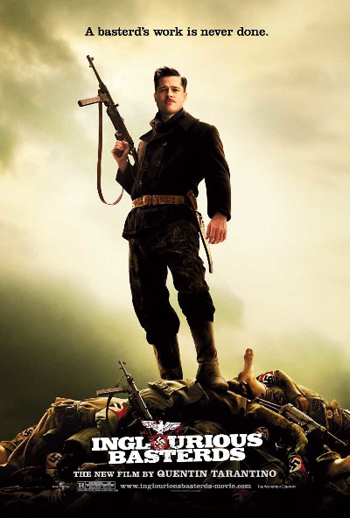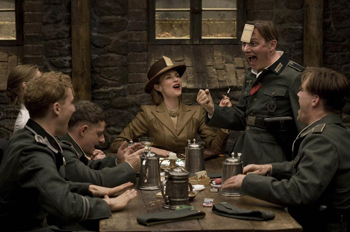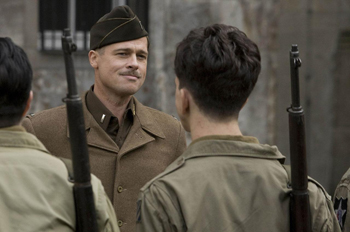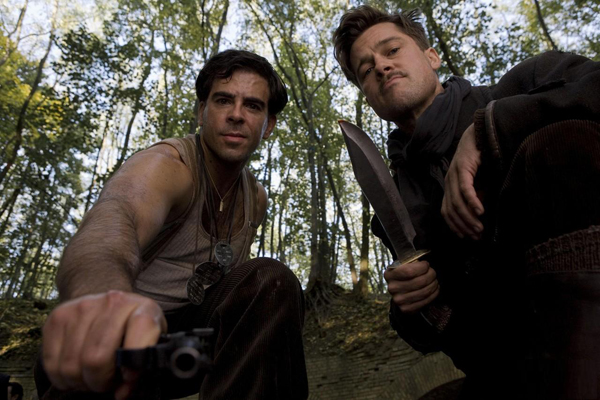 This review was originally published on August 21, and has been edited to include a discussion of the Blu-ray, released December 15.
This review was originally published on August 21, and has been edited to include a discussion of the Blu-ray, released December 15.
I’ve been dying for Inglourious Basterds to reach its official release date, so I could finally talk with you about this movie.
When reading a review, everyone always wants to skip right to the point: Is it any good? Should I spend my hard-earned money to go see it?
Well, let’s cut to the chase then with a nice, small hint: Not only will Inglourious Basterds make my Top 5 Best Films list at the end of this year, but I’m already looking forward to buying the DVD whenever it comes out, so I can revel in the brutal playground of director Tarantino’s semi-historical revenge flick over and over again! So, yes–go see it.
There’s pretty much not a casual filmgoer or cinemaphile on the face of the planet who doesn’t know who Quentin Tarantino (Reservoir Dogs, Kill Bill Vol. 1 & 2) is, or hasn’t seen at least one of his films. Some people expect a Tarantino flick to be nothing more than a tart of spicy dialogue dipped into a warm cup of violence with a bloody cherry on top. But that’s not Inglourious. Being that the film is set in World War II, some will expect it to be a non-stop shoot-’em-up action flick with characters spouting well-worn cliched lines such as “Let’s get those Ratzis!” while lobbing grenades over a distant hill at the enemy. That is also not what Basterds is all about.
Inglourious Basterds is basically a WWII revenge epic, spanning the course of the war, with the intricate, interweaving subplots for which Tarantino is famous. It’s also a lengthy love sonnet to Sergio Leone, master of the spaghetti western, and a huge influence on Tarantino himself. While Inglourious is practically wrapped up in a nice neat bow with a valentine heart reading “From Q to S, with love” on it, this is an unconventional film in almost every way, with an ending both shocking and satisfying on a highly visceral level. If you’ve read other critiques of the film, you can almost guess what that ending is, since virtually every critic is having a hard time keeping their mouths shut about it — champing at the bit like a little kid discovering their first swear word and eager to test out its shock value on the adults in the room. You know what? Damn them for wanting to give it away and spoil such an outright fun and satisfying ending to a similarly fun and satisfying film–quite possibly one of the best endings to any film in recent memory.
Basterds.
And that’s all I’m going to say about that.
 It’s been stated by many in the press””and Tarantino has all but admitted to such””that Basterds is intended to be his great masterpiece, the one he’s been working up to ever since Patricia Arquette bashed James Gandolfini over the head with the back cover of a toilet in True Romance. Unfortunately, while Inglourious Basterds is a damn good film, it’s not Pulp Fiction. Quite possibly, no film that Tarantino ever does will truly reach the gold standard of that film. I remember attending a private screening of PF back in 1994, just like it was yesterday. There was a feeling, both while watching the film and in discussions about it afterward, that a new and powerful presence had arrived in cinema. That presence is still felt today, but cannot be felt in the same manner as his most public debut–therefore, Tarantino has by default already shot his masterpiece. Everything which comes afterward is simply “a film by Quentin Tarantino.”
It’s been stated by many in the press””and Tarantino has all but admitted to such””that Basterds is intended to be his great masterpiece, the one he’s been working up to ever since Patricia Arquette bashed James Gandolfini over the head with the back cover of a toilet in True Romance. Unfortunately, while Inglourious Basterds is a damn good film, it’s not Pulp Fiction. Quite possibly, no film that Tarantino ever does will truly reach the gold standard of that film. I remember attending a private screening of PF back in 1994, just like it was yesterday. There was a feeling, both while watching the film and in discussions about it afterward, that a new and powerful presence had arrived in cinema. That presence is still felt today, but cannot be felt in the same manner as his most public debut–therefore, Tarantino has by default already shot his masterpiece. Everything which comes afterward is simply “a film by Quentin Tarantino.”
Which doesn’t mean that said films can’t be triumphs in their own right, and Inglourious truly is one. Set in Nazi-occupied France, the film begins with a visit to a farm by Colonel Hans Landa (Christoph Waltz), infamously known as “The Jew Hunter.” Landa is a patient, meticulous man who has a talent for finding Jewish refugees no matter where they hide, which is why he has come to the farm of a Frenchman whom he suspects is harboring a Jewish family. Landa kills them all, but the eldest daughter Shoshanna (Melanie Laurent) escapes, fleeing into the nearby woods. Landa is fully capable of shooting her down, and indeed does have her in his sights at one point, but extends a left-handed mercy upon her in letting her go. After all, the Reich is in the house, and so Hans has all the time in the world to hunt her down.
 Cut to a couple years later, and Lieutenant Aldo “The Apache” Raine (Brad Pitt) has assembled a team of Jewish-American soldiers whom the Reichstag will soon come to call “The Basterds,” in order to hunt down Nazi soldiers, murder them, collect their scalps, and thereby instill fear into the heart of the Reich. As you’ve undoubtedly seen in the trailers, Raine informs his men that each of them is accountable for collecting 100 Nazi scalps–and boy, does Aldo want those scalps. The Basterds do indeed inflict severe damage upon Nazi troops, eventually drawing the attention and ire of Adolph Hitler (Martin Wuttke), who in no uncertain terms demands they be hunted down, and in particular that the men stop buying into the fearsome myth of “The Bear Jew” (Eli Roth, obviously having the time of his life as Sgt. Donny Donowitz), known to bash in the heads of captured soldiers with a baseball bat. In the meantime, Shoshanna has changed her identity, come to own a small movie theater in Paris, and has dreamed up a plan with her lover Marcel (Jacky Ido) to kill the leaders of the Nazi party, due to a fortuitous meeting with young German war hero Fredrick Zoller (Daniel Bruhl), who has taken a liking to her, while being completely unaware of her true identity.
Cut to a couple years later, and Lieutenant Aldo “The Apache” Raine (Brad Pitt) has assembled a team of Jewish-American soldiers whom the Reichstag will soon come to call “The Basterds,” in order to hunt down Nazi soldiers, murder them, collect their scalps, and thereby instill fear into the heart of the Reich. As you’ve undoubtedly seen in the trailers, Raine informs his men that each of them is accountable for collecting 100 Nazi scalps–and boy, does Aldo want those scalps. The Basterds do indeed inflict severe damage upon Nazi troops, eventually drawing the attention and ire of Adolph Hitler (Martin Wuttke), who in no uncertain terms demands they be hunted down, and in particular that the men stop buying into the fearsome myth of “The Bear Jew” (Eli Roth, obviously having the time of his life as Sgt. Donny Donowitz), known to bash in the heads of captured soldiers with a baseball bat. In the meantime, Shoshanna has changed her identity, come to own a small movie theater in Paris, and has dreamed up a plan with her lover Marcel (Jacky Ido) to kill the leaders of the Nazi party, due to a fortuitous meeting with young German war hero Fredrick Zoller (Daniel Bruhl), who has taken a liking to her, while being completely unaware of her true identity.
Part of the glory of Basterds is that Tarantino doesn’t ever treat the subject of the Nazis’ evil or the ongoing extermination of the Jews as fodder for farce. While there is a good amount of well-placed humor, displayed mainly by the sparkling delivery of Pitt (Troy, The Curious Case of Benjamin Button), the proceedings are deadly serious and there is tension in a good deal of the scenes. This is a revenge flick, after all, and the path to such is always lined with the opportunity for treachery and things to go wrong at the last minute. Tarantino also values the necessity of subtitles when the Germans are speaking to one another where no Americans are present””especially in the much talked-about 23 minute La Louisiane scene–although it is a wonderful turn on the cliche of having foreign characters mysteriously speak English, when in the aforementioned opening scene on the farm, Hans Landa specifically asks his French suspect if it’s okay if they speak English so Hans can “practice.”

Another cool thing about Inglourious is that in relation to introducing the primary characters, it chops right to the point when setting up the story. Aside from the most important figures””Raine, Shoshanna, Landa, Donowitz, Zoller, Sgt. Hugo Stiglitz (Til Schweiger), a traitor to the Nazi cause and British spy Lt. Archie Hicox (Michael Fassbender)””we are given virtually no backstory to any of the other members of Raine’s group or semi-peripheral characters. The reason: It’s simply not necessary. We don’t need to know why each of the Basterds has signed aboard; the fact that they’re Jewish is reason enough, given the circumstances of what the Nazis were doing at the time. We don’t need to know about Shoshanna’s lover Marcel or how they met, other than that they are truly in love, and he will do anything for her. We don’t need to know why German actress Bridget von Hammersmark (Diane Kruger) is aiding the Basterds’ cause; her character obviously represents the good people who were living in Nazi Germany at the time, but were part of the silent minority, unable to publicly oppose Hitler’s hateful regime. She’s fed up, of course, and wants to rid the world of Hitler however possible–it’s all in her body language. We don’t even need to know how Aldo Raine got that pronounced scar across his neck — the man is somehow looking for payback for some injustice, and if killing Nazis helps him sleep better at night, then so be it. All of this backstory would have unnecessarily eaten up screen time, and with an already hefty run time of just over two and a half hours (I only considered the time once or twice, then was swept right back into the story), Tarantino obviously knew he couldn’t afford to drag his story down.
The acting in Basterds is solid clear across the board, and not for one second (well, with the exception of a rather odd appearance by Mike Meyers as a British general) do you believe you’re watching actors playing their parts–you have been transported to Nazi-occupied France, and you’ve arrived just in time to watch the Basterds get their due.
That’s all that need be said; to do more would give it away, and I’m not about to do that. Go see Inglourious Basterds — it’s a worthy addition to the Tarantino archives, and may very well be the last fun blast of the summer.
Well? What are you waitin’ for? Move out!
BLU-RAY REVIEW: Say what you will about his films, but when it comes to special features, Tarantino is one of the hippest directors in the biz, and Basterds doesn’t disappoint on Blu-ray. You get the usual alternate and deleted scenes, as well as a giant stack of featurettes that give you a closer look at the creation of the Basterds film-within-a-film Nation’s Pride, the original Inglourious Basterds, a conversation with Rod Taylor, and more. There’s also an interesting chat with Tarantino and Pitt, moderated by Elvis Mitchell, a longer version of Nation’s Pride, a film poster gallery, and an impressively robust selection of BD-Live features, including a “Killer Nazis Trivia Challenge.”
Most interestingly, the Basterds Blu-ray incorporates a feature called “pocket BLU,” which allows you to port bonus features to your mobile device along with the included digital copy of the movie. All in all, it’s a hell of a lot of value for a two-disc title that’s currently selling for under $18 at Amazon.
Basterds‘ hi-def transfer is generally pretty impressive, although I did notice some trouble with shadows and red tones during certain spots (most notably the scenes taking place in the lobby of the theater before the Nation’s Pride premiere), and the DTS-HD soundtrack is appropriately muscular, with a decent balance between center-channel dialogue and the score, along with plentiful gunfire and explosions. You expect to get everything and the kitchen sink from a film buff like Tarantino, and Basterds doesn’t disappoint, especially at its current price. –Jeff Giles

![Reblog this post [with Zemanta]](http://img.zemanta.com/reblog_e.png?x-id=ecd97803-6feb-4922-aee3-e48c0b2660a9)



Comments